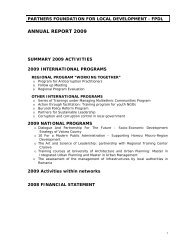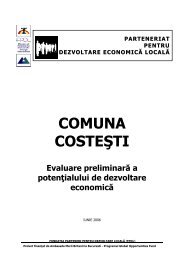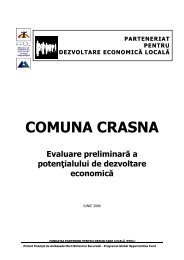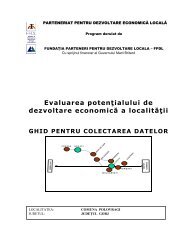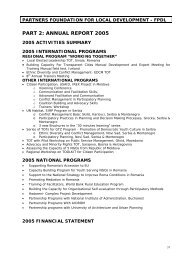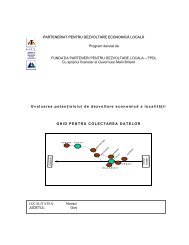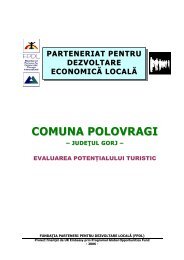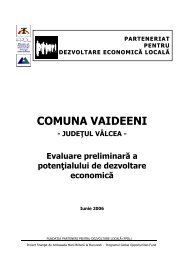Organizational Development: A Manual for Managers and ... - FPDL
Organizational Development: A Manual for Managers and ... - FPDL
Organizational Development: A Manual for Managers and ... - FPDL
Create successful ePaper yourself
Turn your PDF publications into a flip-book with our unique Google optimized e-Paper software.
Preamble<br />
The effectiveness <strong>and</strong> efficiency of local governments directly depend on the factual content <strong>and</strong><br />
organization of their activities. Any serious attempt to improve operation of the local administration<br />
in CEE <strong>and</strong> CIS <strong>and</strong> enhance their capacity in dealing with local issues faces the need to have a<br />
clear description of what is taking place at the outset of the project.<br />
As our experience says - most of the things that look normal <strong>and</strong> obvious to officials are in fact<br />
very questionable. The actual scope of activities never fully complies with the existing legislative<br />
regulations <strong>and</strong> with dem<strong>and</strong>s of life. Local governments, while complaining about the budget<br />
deficiency, do many things that they <strong>for</strong>mally should not do, <strong>and</strong> fail to do some things that are<br />
really obligatory <strong>for</strong> them.<br />
<strong>Organizational</strong> structures <strong>and</strong> corresponding patterns of organizational behavior are often inherited<br />
from the previous regimes or transitional times of total disorder <strong>and</strong> accidental organizational<br />
decisions. One could see unreasonable layers of hierarchy <strong>and</strong> even less reasonable partition of<br />
integral activities into separated functions.<br />
Many organizational procedures were designed to please supervising institutions, bosses or<br />
officers themselves - not the clients. These procedures are far from being effective <strong>and</strong><br />
transparent. They provide unlimited possibilities <strong>for</strong> waste resources, <strong>and</strong> often provoke corruption.<br />
Measures that are established to keep public in<strong>for</strong>med <strong>and</strong> involved are often insufficient or even<br />
substituted with the opposite ones – to ensure that public would not know how certain decisions<br />
are made. Personnel management is often based on executing orders <strong>and</strong> maintaining obedience<br />
to chiefs, rather than on any objective criteria of success in per<strong>for</strong>ming corresponding tasks.<br />
Both external (national, federal etc.) legislative framework <strong>and</strong> internal regulations are often very<br />
tangled, unclear, <strong>and</strong> provide no guidelines to asses the per<strong>for</strong>mance of the personnel <strong>and</strong> find out<br />
where the poor results are caused by the lack of motivation <strong>and</strong> skills, <strong>and</strong> where they are just<br />
consequences of the deficient organizational order.<br />
Thus, considerably serious <strong>and</strong> costly projects of organizational capacity building in local<br />
governments should be necessarily based on a more or less complete assessment of the current<br />
state of things. By analogy with international practice of the assessment of management system<br />
according to a certain set of rules that comes from the best practices (e.g. ISO 9001), such an<br />
assessment may also be called a "management audit".<br />
Local governments, which are committed to make investments in improvement of their functioning,<br />
dem<strong>and</strong> <strong>for</strong> such an audit. It may also be initiated by the Councils who want to know if the<br />
executive branch is well organized <strong>and</strong> per<strong>for</strong>ms its functions well.<br />
In other cases, the executives, who plan organizational changes, want to have a complete <strong>and</strong><br />
clear picture of the actual state of things, their roots <strong>and</strong> grounds. What is necessary <strong>and</strong> what is<br />
voluntary, what is regular <strong>and</strong> what is accidental? What is considerable <strong>for</strong> changes <strong>and</strong> what is a<br />
“mile stone”? Where <strong>and</strong> when do most of the pitfalls occur? Is there any room <strong>for</strong> improvement of<br />
effectiveness <strong>and</strong> efficiency? Answers <strong>for</strong> these <strong>and</strong> many similar questions are far beyond the<br />
obvious, <strong>and</strong> they are extremely important.<br />
<strong>Organizational</strong> assessment may be useful at any time, but after the elections, when new leaders<br />
come to power <strong>and</strong> intend to utilize the advantage of having considerably ‘free h<strong>and</strong>s’ <strong>for</strong> changing<br />
some or many organizational decisions, such an audit is usually most welcomed.<br />
All these things look obvious, <strong>and</strong> one could only be surprised, how little is done in developing of<br />
management audit tools in respect to local governments in CEE <strong>and</strong> CIS. These methodological<br />
recommendations are aimed if not to fill the gap, then to start doing it.<br />
166




